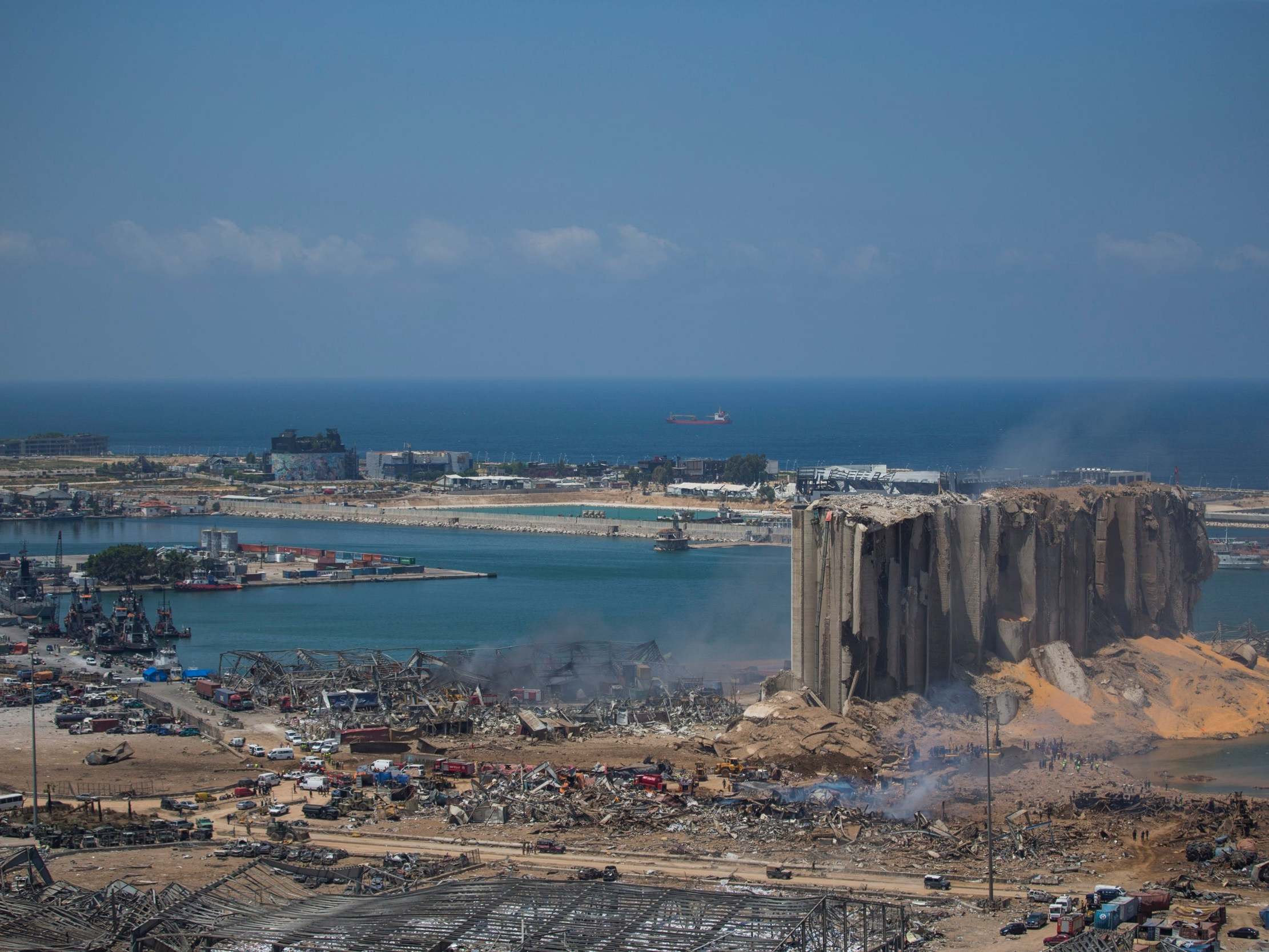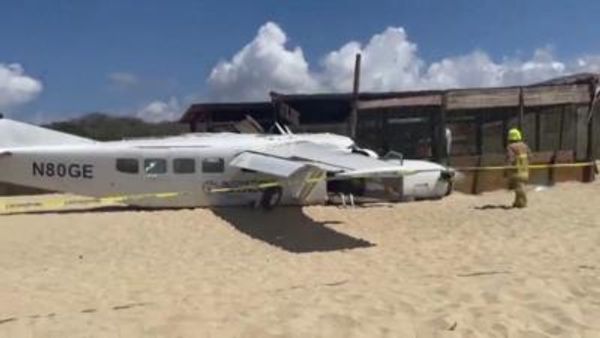
Lebanon’s cabinet has declared a two-week state of emergency in Beirut following a huge explosion at the city’s port which sent shock waves across the capital on Tuesday, killing at least 135 people and injuring thousands.
Marwan Abboud, Beirut’s governor, said more than 300,000 citizens had been left unable to sleep in their own homes due to the explosion, which is thought to have been caused by 2,750 tonnes of ammonium nitrate that was stored unsafely at the port for six years.
It came as ministers agreed to place Beirut’s port officials under house arrest until responsibility for the disaster has been determined and documents revealed custom officials had warned of the “serious danger” posed by the chemical stockpile years before the explosion yesterday.
Please allow the live blog a moment to load...
The death toll from a huge explosion that rocked Beirut on Tuesday has reached 100, the Lebanese Red Cross has said, with fears the number of fatalities will continue to rise today.
The organisation said it was coordinating with the health ministry for morgues to take victims because hospitals were overwhelmed, according to Lebanese media.
Our reporter, Harry Cockburn, has the full story below:
Lebanon’s president has suggested a stockpile of more than 2,700 tonnes of ammonium nitrate was the cause of the huge explosion on Tuesday.
President Michel Aoun said the storage of the dangerous chemical, which had apparently been kept for six years at the port without safety measures, was “unacceptable”.
Mr Aoun called for an emergency cabinet meeting on Wednesday.
Mohammed Fahmi, the interior minister, also told a local TV station that it appeared the blast was caused by the detonation of ammonium nitrate.
All the broadcaster’s staff are reportedly safe after the explosion.
The UK government is “working urgently” today on what can be done to help Lebanon following the explosion yesterday in Beirut, a minister has said.
“It is a terrible tragedy and the thoughts of us all are with the people of Lebanon this morning,” Nick Gibb, the schools minister, told BBC Radio 4’s Today programme.
“The government is working urgently this morning on what we can do to help the Lebanese government with technical support and working with our allies to provide financial assistance.”
He added that there would be further announcements today about what support would be provided to the country.
Earlier this morning, Mr Gibb was asked about the possible cause of the blast following comments by Donald Trump suggesting it might have been an attack.
The minister replied: “The Lebanese authorities are of course investigating the cause of that tragedy and before we have the results of that inquiry it is premature to speculate.”
Lebanon’s prime minister has appealed to all countries to extend help to his nation in a televised speech, saying: “We are witnessing a real catastrophe.”
Hassan Diab reiterated his pledge that those responsible for the massive explosion at Beirut's port on Tuesday will pay the price, without commenting on the cause.
At least 100 people have been killed and more than 4,000 injured by the blast, with major damage to the city amid an already dire economic crisis.
As Bel mentioned in the clip, her flat was one of the many buildings in the city which have been severely damaged by the explosion.
Emergency workers and medical personnel from around the world are heading to Lebanon today after the explosion which devastated Beirut’s port area.
France said it was sending two planes with dozens of emergency workers, a mobile medical unit and 15 tonnes of aid - with the hope that this will help with treatment of about 500 victims.
Emmanuel Macron’s office said French peacekeepers stationed in Lebanon, a former French protectorate, had been helping since the explosions.
Jordan said a military field hospital including all necessary personnel would be dispatched, according to the Royal Court, while Egypt has opened a field hospital in Beirut to receive the wounded.
Elsewhere, Jan Hamacek, the Czech interior minister, said Lebanon had accepted an offer to send a team of 37 rescuers with sniffer dogs to Beirut, Denmark said it was ready to provide humanitarian assistance to the country, and Greece said it was ready to help authorities “with all means at its disposal.”
Donald Trump has been widely-criticised for suggesting that the deadly explosions in Beirut on Tuesday may have been an “attack” or “bomb”.
The president said the blasts “looked like an attack” yesterday despite no immediate evidence pointing to that conclusion and no official cause being determined yet.
Brett McGurk, a former national security official for the Trump, Obama and Bush administrations, said the president's remarks were "wildly irresponsible".
Our reporter, Alex Woodward, has the full story below:
Russia's emergency officials have said the country will send five planeloads of aid to Beirut to help with the aftermath of the explosions on Tuesday.
The Russian Ministry for Emergency Situations will send rescuers, medical workers, a makeshift hospital and a lab for coronavirus testing to Lebanon.
Turkey’s Humanitarian Relief Foundation (IHH) is helping in the search for survivors in Beirut following Tuesday’s explosions, with Ankara offering to build a field hospital and send help as needed.
“We've relayed our offer to help” (including immediate work on the hospital) and “we are expecting a response from the Lebanese side,” a senior Turkish official told Reuters.
Mustafa Ozbek, an Istanbul-based official from the group, said members of the IHH group were digging through debris to look for people and recover bodies on Wednesday, and the group had also mobilised a
kitchen at a Palestinian refugee camp to deliver food to those in need.
“We are providing assistance with one ambulance to transfer patients. We may provide help according to the needs of the hospital,” he said.
Pope Francis has offered prayers for Lebanon and the victims in Beirut today as the death toll from the explosions on Tuesday stands at more than 100 people.
The pontiff appealed that '”through the dedication of all the social, political and religious elements,” Lebanon “might face this extremely tragic and painful moment and, with the help of the international community, overcome the grave crisis they are experiencing.”
His words came as international aid headed to the city, with countries such as France, Poland and Russia sending medical workers and supplies.

Custom officials warned of the “serious danger” posed by the ammonium nitrate stockpile at Beirut’s port years before yesterday’s explosion, documents unearthed by Al Jazeera have shown.
Lebanese officials have pointed to the chemicals as a possible cause of the blast, which has killed at least 100 people and injured thousands.
The cargo of ammonium nitrate is understood to have arrived in Lebanon in 2013 and custom officials sent at least five letters to judges between 2014 and 2017 asking for guidance on what to do with the chemicals.
A letter from 2016 reported by Al Jazeera today said there had been no reply to the requests for help.
“In view of the serious danger of keeping these goods in the hangar in unsuitable climatic conditions, we reaffirm our request to please request the marine agency to re-export these goods immediately to preserve the safety of the port and those working in it, or to look into agreeing to sell this amount,” the letter said, as reported by Al Jazeera.
There were reportedly three options suggested for dealing with the cargo - exporting it, giving it to the Lebanese Army or selling it to the privately-owned Lebanese Explosives Company.
You can find their conversation below:
International troops serving in the UN’s Interim Force in Lebanon are among those injured by the massive explosion at Beirut’s port yesterday.
Bangladesh’s military said at least 21 Bangladesh Navy members of the multinational force in Beirut had been injured, with one of those injured in critical condition at the American University of Beirut Medical Centre.
Bangladesh Navy members have been working in Lebanon with the UN force since 2010 to prevent entry of illegal arms and ammunition.
Separately, Lorenzo Guerini, Italy’s defence minister, said one soldier assigned to Italy's contingent in Lebanon was injured.
The full scale of the devastation in Beirut has been captured by drone footage as rescue workers continue operations to search for survivors today.
The blasts, which struck at 6pm local time, hit the Lebanese capital with the force of a 3.5-magnitude earthquake and have left thousands injured.
Our reporter, Emily Goddard, has the full story below:











